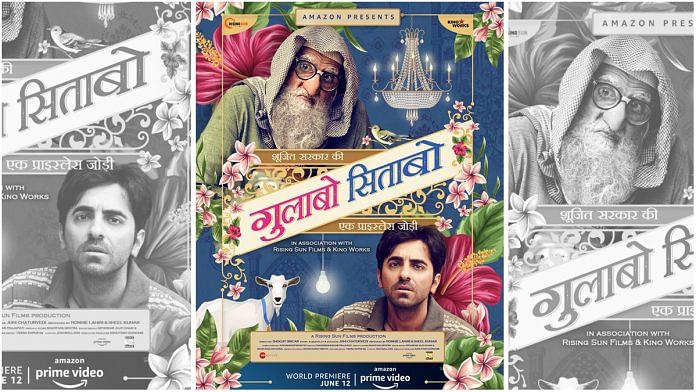Eccentricity has fast become Bollywood’s preferred flavour over the last couple of years. If the 1990s and early 2000s were about highlighting an idealised normal, with family-friendly blockbusters from the Chopra and Johar stables, the 2010s are about owning our quirks and idiosyncrasies. Shoojit Sircar’s Gulabo Sitabo, now out on Amazon Prime, is a clear case in point.
This is a dramedy about two foes — Mirza (Amitabh Bachchan), a cantankerous, greedy old man obsessed with Fatima Mahal, the 100-year-old palace he and his wife, Begum (Farrukh Jafar), own, and one of his tenants, Baankey Rastogi (Ayushmann Khurrana), a young man struggling to make enough to feed and educate his family comprising his mother and three younger sisters.
Rastogi is just one of the handful of people who live in the dilapidated and crumbling haveli. Each tenant pay less than Rs 100 as rent to the miserly Mirza, who is on an eternal mission to get cash from anywhere possible. He’ll pawn off fixtures and belongings from the haveli and he’s not above a bit of stealing.
While Rastogi and Mirza are always at loggerheads, bickering and taking entertaining swipes at each other, they have a shared love, something they are both willing to fight to the death for — Fatima Mahal. As the two plot endlessly to get back at each other, with Mirza determined to evict Rastogi and the latter equally determined to live there forever, the future of the haveli itself is threatened, forcing the two enemies into a race to outwit the other in time.
Cinematography, writing, performances lift film when it sags
Refreshingly written characters, colourful dialogues and masterful cinematography make Gulabo Sitabo a pleasant watch. Bachchan delivers a touching performance as a bent-over, clever, but slow Mirza, whose greed is his driving emotion but is limited to the small game of Rs 100 or so. The heavy prosthetics, used as an element of caricature, push the actor out of Bachchan, who deftly uses his face and dramatically changed gait to bring nuance. Khurrana matches him with a toned-down rendition of the common man, a character that’s come to define his career now.
Instead of his usual candour and confidence, Khurrana chooses to bring Rastogi’s desperation and insecurities to the forefront. The excellent supporting cast of Vijay Raaz as an officer of the Archaeological Survey of India, Brijendra Kala as a lawyer and Srishti Shrivastava as Rastogi’s sister shine at par with the two stars.
The real star of the story, however, is Fatima Mahal itself. Tucked away in one of the many old, forgotten pockets of Lucknow, Fatima Mahal is one of the many palaces, laden with history, that pepper the town.
Cinematographer Avik Mukhopadhyay takes his time and lovingly shows off every nook and cranny of the ruin, in all its dilapidated glory. Its presence is felt even when it’s not on screen, thanks to Juhi Chaturvedi’s writing. t looms over the story, in the dialogues and in the eyes of the characters.
Where the film falters, however, is in its scripting, pacing, and editing. The filmmaker and writer both take too long to establish situations and plotlines, many unnecessary, and teeter at the edge of boring the audience. While the jokes and quips will make you chuckle in the moment, the humour is nothing to write home about and hence, the only thing keeping you in your seat is the resolution, which is thankfully unexpected but, again, stretched out and could easily be cut and made crisper.
Gulabo Sitabo serves as a welcome distraction in these times and is worth a watch simply for the cinematography and characters. But is it worth a rewatch? Not really.




A jarring note in the film was the analogy with the title which has two females. It could not be Mirza and Bankey, nor Mirza and Begum. Was it named just to pay pseudo-tribute the art form? Does the script writer enjoy the liberty to let loose a stray title on an unsuspecting audience? Film critics and media are silent about the glaring incongruence. Is film criticism awed by the publicity machinery of studios film gradually loosing its acerbic wit and happy with paeans to the reputed and the mighty? Is it going the media way?